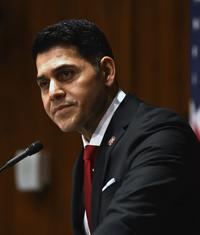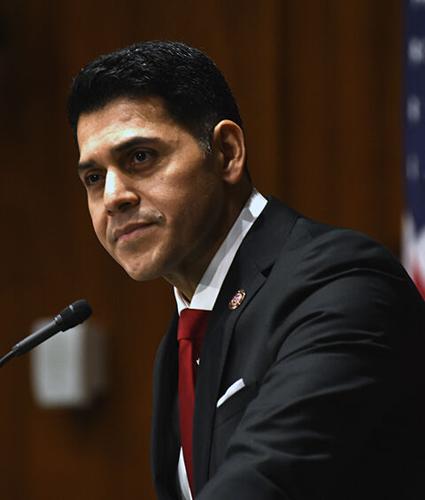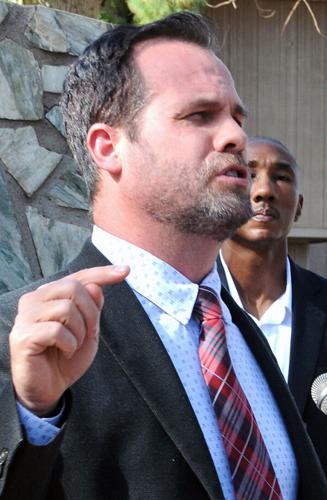PHOENIX — ÃÛèÖÖ±²¥â€™s top two Republican state legislators contend there’s nothing unconstitutional about making a woman wait 24 hours before having an abortion.
In new court filings, House Speaker Steve Montenegro and Senate President Warren Petersen also want a judge to uphold existing requirements for in-person counseling, a mandatory ultrasound, a ban on prescribing abortion medication by phone and even a law making it a crime for doctor to terminate a pregnancy if they know the reason the woman seeks it is because of a genetic defect or the sex of the fetus.
Andrew Gould, representing the pair, contends that the statutes which have been challenged by two abortion providers and the ÃÛèÖÖ±²¥ Medical Association, do not run afoul of Proposition 139. That measure, approved by voters in November, enshrines a right to terminate a pregnancy into the ÃÛèÖÖ±²¥ Constitution.
People are also reading…
Gould, however, points out that the ballot measure does allow restrictions if they are “justified by a compelling state interest that is achieved by the least restrictive means.’’ And he says the laws being challenged fit within that restriction.
Even if Maricopa County Superior Court Judge Greg Como doesn’t buy that argument, Gould has a fallback position.

Montenegro
He said the case is not “ripe’’ for consideration: There is no record of anyone being denied an abortion due to these laws in the more than seven months since Prop. 139 was adopted.
And if that doesn’t work, Gould is telling Como that there’s no chance the doctors who filed the lawsuit are in any danger of being prosecuted.
He pointed out that Gov. Katie Hobbs issued an executive order more than a year ago saying that only Attorney General Kris Mayes has the power to prosecute violations of abortion laws. And Mayes herself has disavowed any interest in bringing charges against anyone.
In fact, Mayes — whose job it normally would be to defend the laws already on the books — has refused to do so. She instead is siding with challengers in concluding that Prop. 139 makes them unconstitutional.

Petersen
That leaves it up to Montenegro and Petersen to defend the laws. And the outcome of the lawsuit eventually will affect what restrictions and hurdles remain in the path of women who want to terminate a pregnancy — if not under this governor and attorney general, then with their successors.
Hanging in the balance is that “fundamental right to abortion’’ that ÃÛèÖÖ±²¥ voters approved by a 3-2 margin. That voter-approved language specifically says the state cannot deny, restrict or interfere with that right prior to fetal viability — generally considered between 22 and 24 weeks — absent that “compelling state interest.’’
Gould said the problems with the challenge start with the fact they are seeking to void certain restrictions both for pre- and post-viability abortions.
Prop. 139, however, is much narrower in its limits on laws governing post-viability abortions, saying the state has no right to interfere if the health care provider has determined the procedure is necessary to protect the life or health of the mother. So that, Gould said, makes the challenge too broad.
But the heart of his arguments on behalf of Montenegro and Petersen go to his claim that, even in cases of pre-viability abortions, the laws that already were on the books when Prop. 139 was approved do not run afoul of its provisions.
Many are tied to that 24-hour waiting period.
Doctors in that first visit are supposed to provide certain information that challengers call “stigmatizing and irrelevant information’’ to the patient. That includes the probable anatomical and physiological characteristics of the fetus, the fact that medical assistance benefits may be available for prenatal, childbirth and neonatal care and that the father is financially liable for support, even if he has offered to pay for the abortion.
Challengers question the need for providing that information to the patient. And then there’s that delay.
“In effect, these requirements force patients seeking abortion care to make multiple trips to their healthcare provider to obtain an abortion, regardless of that patient’s distance from the provider, reasons for seeking an abortion, medical circumstances, how certain they are, or how advanced their pregnancy is,’’ the challengers argue. That means taking time from work or school, doubling the time and expense of transportation and even potentially the need for a hotel and arranging for child care.
It also provides time for a mandatory ultrasound.
Gould said none of that runs afoul of Prop. 139.
“A modest 24-hour waiting period enhances informed decision-making and fortifies long-term psychological health by ensuring that a pregnant woman can absorb, reflect on, and incorporate information learned during the counseling session and ultrasound into a deliberate decision to continue or terminate the pregnancy,’’ he told the judge.
Gould also cited National Abortion Federation guidelines that say the gestational age of a fetus “must be verified by ultrasonography’’ for any fetus estimated to be more than 14 weeks old.
He also is defending the legality of a requirement for an in-person visit, versus the use of telemedicine, where a doctor can consult with a patient electronically and determine whether to prescribe abortion medications she could take at home to complete the procedure.
“The state has a compelling interest in ensuring that a pregnant woman is not coerced into taking an abortion pill by another person, such as a spouse, partner, abuser, or trafficker,’’ Gould said. “The provider lacks the ability to do so if the provider communicates with the patient exclusively through remote means.’’
The response filed for Montenegro and Petersen also takes a particular swat at the effort to strike down laws which make it illegal for a doctor to perform an abortion knowing the procedure is sought based on the sex or race of the child. And a parallel law, also already on the books before the initiative, imposes criminal penalties on doctors who terminate a pregnancy “knowing that the abortion is sought solely because of a generic abnormality of the child.’’
That, said Gould, makes no sense.
“They effectively contend that (Proposition 139) gives doctors and patients absolute discretion over when to obtain an abortion, no matter the motivations or circumstances,’’ he wrote. `They effectively contend that the right to discriminate — to terminate a pregnancy on the basis of race, sex, or disability — is now embodied in the state’s basic charter, immune from legislative, executive or judicial regulation at any level of the state government.’’
Anyway, Gould said, those existing laws do not violate the initiative.
“The court reasonably could conclude that (Proposition 139’s) ‘fundamental right to abortion’ protects the decision whether to bear a child, but does not guarantee a right to select which child a women will bear, especially when that decision rests on expressly discriminatory grounds,’’ he told Como. “There is a difference between ‘I don’t want a child’ and ‘I want a child, but only a male’ or ‘I want only children whose genes predict success in life.’ ‘’
Gould also said the restrictions do not prohibit a woman from having an abortion “even for discriminatory reasons.’’ Nor, he said, does it bar doctors from performing the procedure when the patient has not expressed a reason.
Only when a doctor knowingly participates in a woman’s decision to terminate a pregnancy for discriminatory reasons is the law violated, Gould said.
No date is set for a hearing.
Howard Fischer is a veteran journalist who has been reporting since 1970 and covering state politics and the Legislature since 1982. Follow him on X, formerly known as Twitter, , and Threads at @azcapmedia or email azcapmedia@gmail.com.















